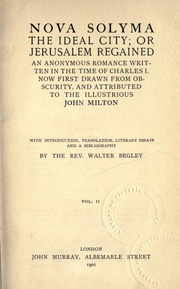Advertisement
If you have a new account but are having problems posting or verifying your account, please email us on hello@boards.ie for help. Thanks :)
Hello all! Please ensure that you are posting a new thread or question in the appropriate forum. The Feedback forum is overwhelmed with questions that are having to be moved elsewhere. If you need help to verify your account contact hello@boards.ie
Hi all,
Vanilla are planning an update to the site on April 24th (next Wednesday). It is a major PHP8 update which is expected to boost performance across the site. The site will be down from 7pm and it is expected to take about an hour to complete. We appreciate your patience during the update.
Thanks all.
Vanilla are planning an update to the site on April 24th (next Wednesday). It is a major PHP8 update which is expected to boost performance across the site. The site will be down from 7pm and it is expected to take about an hour to complete. We appreciate your patience during the update.
Thanks all.
League of Extraordinary Books
Options
Comments
-
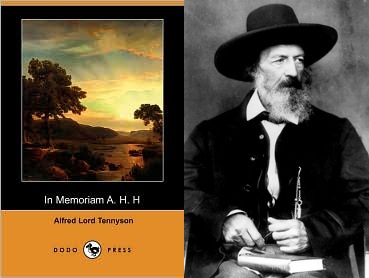
In Memoriam by Alfred Tennyson (1849)
A very long poem lamenting the loss of a friend and brother-in-law. I don't give ratings based on quality only enjoyment. And overall i thought this was pretty meh.
There are times when it sparkles but the quality seems very uneven. I like poetry best when its telling a story or painting a picture.
I understand this was written over 17 years but it feels like there was a significant gap before the final 5th, as suddenly it becomes more philosophical and the grief seems severely reduced from the first 4/5ths.
The read does raise some interesting questions though. Due to its length it can come across (perhaps quite wrongly) as self-centered, being so focused on the authors grief with seemingly no thought for anyone else's. Including his sister who was married to the deceased. In fact she barely gets a mention until the end.
I also wonder how much of this affection was returned. Call me cynical but in my experience love/friendship is never mutually strong.
I've always had trouble processing/appreciating poetry that isn't story based (like Idyll's of the King which is awesome!) and this read has none nothing to show that i've grown over the years . [2/5]
. [2/5]
Culhwch and Olwen by unknown (1100)
aka The Twrch Trwyth
Welsh fairytale. Quite long for a folktale and utterly insane. Arthur and his knights appear as sort of background characters. There's a couple of very long lists which feel like they were designed to challenge the memory of the oral storytellers, these can also be a challenge to the reader . Some funny moments as well as crazy ones. [4/5] 0
. Some funny moments as well as crazy ones. [4/5] 0 -
New Items:

Good Soldier Svejk by Jaroslav Hasek (1923)
The satirical tale of a czech soldier, part of the austro-hungarian army during WWI. A lot of the humour of this story still holds up well. It would have been nice to know that the book is unfinished, however although you'd like more closure the story still stands up well as it is.
Svejk is very much like Baldric from Black Adder or Homer Simpson, but your never entirely sure how stupid he is. Oh he's certainly not the brightest but behind that suspiciously honest face is a pretty devious mind, at least at times.
The Czechs are looked down on by the rest of the army and people are constantly trying to find traitors or reasons to punish the lower ranks. Svejk has developed the perfect defense to survive in these dangerous conditions, constantly agreeing with everything the army does (on the surface), coupled with a garrulous nature that usually drives his superiors nuts and makes them forget what they were planning to do to him.
His constant stream of little stories, are both a highlight and a problem of the book. It might be quite annoying for some to have these innumerable diversions and i personally thought it would get old fast but it never really did for me, i did however quite like it on those occasions when Svejk was ordered to shut up before he could finish .
.
Oh.. and the constant suspicion and risk of being locked up or executed by your own side, made it seem like a parody of 1984 at times.
As i said its unfinished and more of a denouement would have been nice but overall very good and i won't be forgetting Svejk any time soon. [4/5]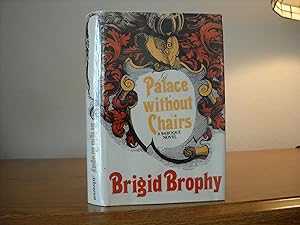
Palace Without Chairs by Brigid Brophy (1978)
Well that was fun . The trials and tribulations of various characters from the small democratic monarchy of Evarchia. Mostly following the members of the royal family.
. The trials and tribulations of various characters from the small democratic monarchy of Evarchia. Mostly following the members of the royal family.
Clearly inspired in parts by Gormenghast but its players are more real and a little less grotesque. Its a book about characters and setting rather than plot. You could also compare it to Dickens books like Bleak House , or South Wind by Norman Douglas.
Its a very funny book too at least to start with although the humour, while it doesn't disappear, gets pushed into the background during the final quarter.
I actually found Brophy's writing style a little... complex. Its not that she uses long words or anything but the way she puts sentences together, just seemed to throw me off at times and i was forced to reread.
The other thing which i had to adjust too is the scene changes. Some scenes can be very short and when you switch to the next your never sure how far the jump will be, will this be 5 mins ahead or days or weeks. As someone who's mind tends to travel on rails this can be a little disconcerting.
Finally due to its lack of plot the ending doesn't really seem to mean much, it comes so far out of left field.
Overall though, much like Gormenghast this is a beautifully drawn (rather than written) book and left me wanting more, which is always preferable to the alternative . [4/5] 0
. [4/5] 0 -
New Items:

Sir Edward Seaward's Narrative of His Shipwreck by Jane & William Porter (1831)
A man is shipwrecked on a desert island completely alone except for his loving wife, dog, couple of goats and an assortment of chickens and ducks. With nothing to rely on but his wits, assorted firearms, tools, utensils, furniture, clothes and few tons of precut timber :P .
This is a hard one to rate, if rated in a void its a decent 3 stars but i've deducted 1 due to the large number of similar books.
There's a lot of god-bothering in this but its not too annoying as our hero's are so simple. For a shipwreck story its also remarkably uneventful. After awhile it becomes almost a utopian fiction, or rather its like reading someone's gaming blog where they describe playing Civilization or Age of Empires or similar fare. As this colony is built up, crops made, wood cut, research done, weapons bought, soldiers recruited, ships built etc. etc.
It becomes really bogged down in numbers too, there's a surprising amount of accounts and stock keeping detail which seems pretty superfluous.
Things do pick up again towards the end with some political commentary. Overall, i'm not really sure what the point of this book was, it's hard to classify it as a highseas adventure. In any case while it was an easy read and not boring it doesn't really have much to recommend it over other castaway stories. Not bad though on its own merits.
Note: I was very puzzled by mention of the Queen of England in 1735, when no King is mentioned. I eventually worked out this is Caroline of Ansbach, queen to George II. So there is a king at this time but he's not mentioned because he was often out of the country and Caroline was the brains of the operation and very politically influential which becomes apparent in this story. [2/5]
Smarra by Charles Nodier (1821)
aka the Demons of the Night
Short horror tale. A man enters dreamland to hang out with his harem of girls and carouse in his dream palace but runs into an old friend who has been stalking an evil sorceress. Incredibly over the top purple prose, similar to Lovecraft's dream stories. People say this is a vampire tale, those people are idiots. [3/5]
Branwen daughter of Llyr by unknown (1100)
Another short crazy welsh folktale. This time a war breaks out between ireland and wales. I really like the fact that both kings are pretty decent but still unable to stop the conflict. I also like that the Irish put up a pretty good fight despite the welsh king being a giant . [3/5] 0
. [3/5] 0 -
New Items:

Mogador, the Names of the Air by Alberto Ruy Sánchez (1987)
First a little background. I purchased this online along with two other books, this being the most expensive of the three. Picture my disappointment when i unpacked it and found it was this slim little volume of only 90 pages!
It was going to have to do something really impressive to counter my initial hostility... and it did .
.
Firstly a nice little touch is that all the writing is indented.. as if it were done on a typewriter with really heavy keys. This gives it a tactile feel which is entirely appropriate to the story.
Secondly this certainly didn't feel like 90 pages! The text is so purple and over the top. Its the literary equivalent of a really rich desert, the kind you can only eat in small amounts. Now i'm sure some readers will be able to breeze through it and those may find it short but i could barely get through a couple of chapters a day (of only about 5-6 pages).
I will say that the writing doesn't always land. Thats always the risk with this kind of purple prose, if it doesn't land it can come across as pompous or silly. Of course this is also a translation and one can never be quite sure how much is lost in the process.
There seems to be three main sections to the story. It starts off feeling like the Arabian Nights. Then it feels like the filthy version of the Arabian Nights. I remember first hearing about this version in, of all things the film 'Bram Stokers Dracula'. Mina and Lucy are looking at this very naughty book which i at first thought was a version of the Karma Sutra but turns out to be the Arabian Nights. Anyway the first two-thirds of Mogador reminded me strongly of this.
However as we progress the writing calms down somewhat and the story becomes more and more realistic. Which isn't as pleasant as the early unreal elements but thats rather the point.
What i took from the book is that its about how we perceive each other. How we rarely actually know (or care) what people are like and instead invent a version of them in our minds to suit ourselves. Its very similar to the superstitions of old. In our heads we turn people into vampires, angels, sirens or monsters, and our view of reality is as absurd now as it has always been.
If you dislike purple prose or are squeamish about sex then you'll hate this. Personally i was very impressed . [4/5]
. [4/5]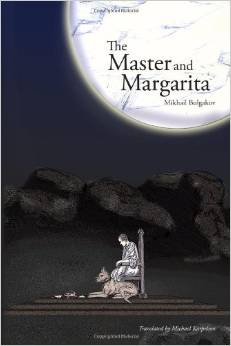
The Master and Margarita by Mikhail Bulgakov (1940)
A black magic black comedy. Chaos ensues in Moskow with the arrival of a magician and his entourage.
The actual story elements of this are fine... not great but fine. However i had major problems with the delivery. Its the same issues i usually have with fairy tales or pulps. A lack of descriptive writing combined with a narrators perspective, rather than a character perspective. This approach keeps you at a distance from the story and without that connection i just find it very difficult to care, and if i don't care then i find it a very tedious read.
I was reading the Glenny translation and gave up about a 3rd of the way through switching to an audiobook Karpelson translation. This is much easier to experience as audio than writing and i don't think it was just the translation change.
The entire first half of this book is really just setup. Its a sequence of horrible events which reminded me strongly of the film the Omen. As i said at the start this does seem to be a black comedy but you'll be forgiven for forgetting that its a comedy for long stretches in the first half.
The second half is much easier to digest. Its more absurd and funnier, you also have a more interesting character to focus on.
Finally theres the substory involving Pontius Pilate. These parts feel the most important and if there is any point to this book then this is where your likely to find it. It reminded me of the pirate sub-story from Watchmen.
Overall this is a very visual novel. There's plenty of images in this that i won't forget anytime soon. However it never felt like it had much depth and i'd never have got through it in its written form. [2/5]0 -
New Items:
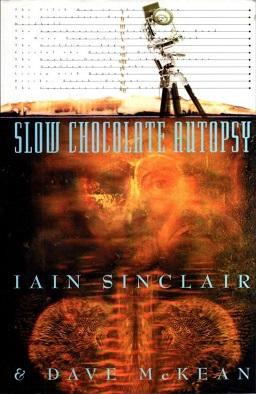
Slow Chocolate Autopsy by Iain Sinclair (1997)
Sinclair, known quantity. Past work. Non-fiction, stories of the city. Mundane mysticism. Magic of the wasteground. Beauty in poverty. Nostalgia for dog turds.
Style? Broken mirror. Reflections, ugly or beautiful depending on angle. Interesting patterns.
Start small. Minor inconveniences. Sexism, racism, homophobia. Casual or intended? Who knows.
Single work or multiple source? Behind dresser, under sofa, recovered fragments repackaged as new? Who cares.
Fraud? hipster bait, tilted urinal, paint spackle as magic eye picture? Maybe not.
Private function, members only, password please, no Homers? Maybe so.
Whats the story, morning glory? Story is the story, narrative as narrative.
If Narrative = Narrative, then Narrative = Anything.
Anything >= Bollocks then Narrative = Bollocks.
Selling point?. Make something up. 'Norton... Trapped in space - within the city limits of London - but not in time'. Sounds like a blurb. True? no, fiction. False? no, fiction. Its all fiction, why not the blurb too.
The above review is written in lingua-bollocka. If you speak lingua-bollocka then you might well enjoy this book more than i did . [2/5]
. [2/5]
S.F.X. van Dusen, First Experience by Jacques Futrelle (1905)
Short story. Neat little bit of logical deduction serving as an intro to the detective/scientist character of van Dusen. [3/5]
S.F.X. van Dusen, Dressing Room A by Jacques Futrelle (1906)
Another short detective tale of a missing actress. Some of the reasoning is a little iffy but decent puzzle. [3/5]
Film Item:edia/en/thumb/d/d0/What_Ever_Happened_to_Baby_Jane%3F_(1962).jpg/220px-What_Ever_Happened_to_Baby_Jane%3F_(1962).jpg
Whatever Happened to Baby Jane? (1962)
Misery lite. Interestingly ambiguous and good ending but still a bit of a slog. But then i wasn't a fan of Misery either. Seems at times like its trying for black comedy and just not quite hitting it. [2/5]0 -
Advertisement
-
New Items:
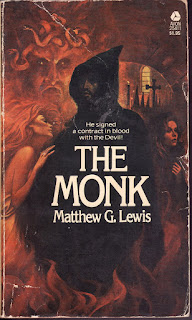
The Monk by Matthew Gregory Lewis (1796)
Well that was absolute chaos. I'm very tempted to give it 4 stars but... can't quite. This is so over the top. Its a complete melodrama, but it also goes to places so much more extreme than i expected. It's is also a complete mess. The author tends to follow a character until he hits a wall, then backup and head off in another direction. A lot of it feels very pulpy, its clear that a lot of it was not planned out from the start, despite the annoying foreshadowing we get. It stops every so often to do a little poem or song and characters seem to switch personalities at the drop of a hat.
On the other hand it also has a remarkable amount of humanity. People act in very human ways. Their thoughts and motivations make sense a lot of the time... and then it breaks out into crazy supernatural stuff.
This review is as uneven as the novel . Oh and then there's the weird view of superstition it keeps bringing up. At times it feels like it might be a joke but it makes such a big deal of people not being superstitious even while actual apparently supernatural stuff is happening. I mean at one point a demon laughs at how superstitious people are!
. Oh and then there's the weird view of superstition it keeps bringing up. At times it feels like it might be a joke but it makes such a big deal of people not being superstitious even while actual apparently supernatural stuff is happening. I mean at one point a demon laughs at how superstitious people are!
Also i couldn't get that episode of the Simpsons with Ned Flanders as the devil out of my head during those final dungeon scenes, i don't think that was the mood the author was going for :lol .
The ending gets even more uneven than the rest, there were several points were i expected it to end but it just kept going.. much like this review.
The most pulpy and extreme of the Gothic's i've read and really fun for long stretches. [3/5]
O Ugly Bird! by Manly Wade Wilson (1951)
Short tale of a wandering musician fighting the forces of evil . [4/5]
. [4/5]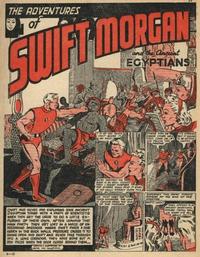
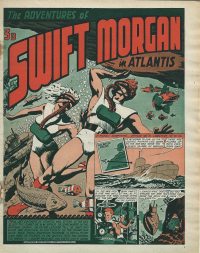



Swift Morgan and the Ancients Egyptians (1948)
aka the Adventures of.. Issue #6 comic. Makes no sense. Did they travel back in time and if so how? Couple of mildly interesting bits but thats all. [1/5]
Swift Morgan in Atlantis (1949)
aka the Adventures of.. Issue #16 comic. Just wretched. Same plot as last time but different location. Still confusing, awful dialogue, no characterization. [1/5]
Swift Morgan and the Flying Saucers (1950)
aka the Adventures of.. Issue #30 comic. Oh, i get it! Its like Scooby Doo, every issue has the same plot. At least this made more sense because of the different location. [2/5]
Swift Morgan and the Planet of Destiny (1953)
aka Swift Morgan Space Comic, Issue #50. Again almost the same plot but spacetravel now treated as routine. Slightly better but still confused and weak. [2/5]
Swift Morgan and the Beast From Outer Space (1954)
aka Spaceways Comic, Issue #52. A sci-fi version of king kong, not terrible. At least the plot was something a bit different. [3/5]
Swift Morgan and the Menace of the Red Mists by James Hart (1954)
A short prose story rather than comic. Still some of the same elements that appear in almost all of these plots, but generally better. The female character actually gets to do stuff. They never let her do anything in the comics. [3/5]
Swift Morgan and the Pirates of Space by James Hart (1954)
Another short story. Again a better plot than the comics. Something for the female character to do and more violent. Just better. [3/5]
Film Item: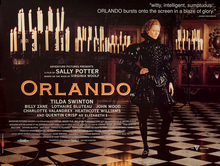
Orlando (1992)
Well that was insane. Pretty good though, interesting asthetics. The famous scene from the book is really short here. Also it takes some interesting but strange liberties with the ending. [3/5]0 -
New Items:

A Midsummer Nights Dream by William Shakespeare (1597)
I've seen this play at least 3 times now and while my most recent experience, by the Globe was a great production i'm still not a big fan. Its really quite a mess with the lovers running about for most of it none of whom i care about and then what feels like 20 minutes extra tacted on to deal with the play within a play.
The Globe version also emphasizes the messed up theseus/hippolyta and oberon/titania relationships. You really feel that hippolyta/titania are ill-used to say the least. However while its great they address that it does leave you with a bit of a sour taste in the mouth. Since although they can show the plays darkside with the acting, they can't actually fix it without rewriting the whole plot.
I really like some of the characters in this and the fairies are a great idea but no matter what version i've tried its never lived up to its promise. [3/5]
Jerusalem's Lot by Stephen King (1978)
Short horror story about a deserted town. Prequel to Salem's Lot. [3/5]
Sea of Lost Time by Gabriel Garcia Marquez (1961)
Short and strange tale about a run down seaside town. Somewhat surreal, little bit messed up. Makes me interested in reading more by this author. [4/5]
Gunga Din by Rudyard Kipling (1892)
Poem about an indian water-carrier in the british army. Told from the point of view of a not very nice soldier and how he learned to appreciate Gunga Din. [4/5]
Comics Items:
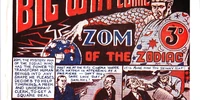

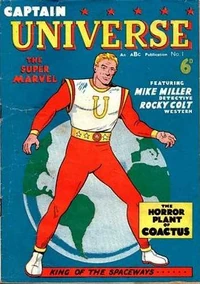
Electro Girl (1946)
aka Super-Duper, Issue #5. Two stories of Electro Girl for the price of one. One is a decent detective yarn and the other a bit of 4th-wall breaking crazyness. [3/5]
Zom of the Zodiac (1948)
aka Big Win Comic. A wish granter, interesting concept. Only two pages found, hard to say if the story is complete. [3/5]
The Shape (1967)
aka Charlton Premiere #1. Shape-shifter similar to Plastic Man but with an enfants mind. Very tongue-in-cheek self-aware story. [4/5]
Captain Universe (1954)
aka Captain Universe #1. Pretty silly and genocidal but fun. Standard superman type character. [3/5]0 -
New Items:

David Copperfield by Charles Dickens (1850)
So that was fun... eventually.. sortof. What was the population of england circa 1850? Based on the number of times people randomly crossed paths in this book i'm guessing it couldn't have been higher than 200 :P .
The first quarter of the story is like a watered down version of Wuthering Heights. In fact the whole book feels a bit watered down. There's a constant darkness lurking about but dickens never commits to it which makes it feel like he's playing safe.
On the other hand whenever one of his ridiculous characters turns up they feel out of place as the story seems too dark and serious for them.
Also the entire plot is told from the point of view of a single character which robs it of the variety of some of his other stories. This tactic does have an upside though. Since our protagonist is rather innocent the reader often figures out things which the character doesn't yet know. This builds up the suspence as we wait to see if our surmises are right. However this trick does rather backfire during the conclusion.
The conclusion feels like it takes forever (there are 9 chapters which i would all consider to be conclusion) and the trick i've mentioned adds to the length as even the most dense of readers will know more or less how things will work out. Those last few chapters were the only ones which really tried my patience.
Despite the silly coincidences and some rather poor plotting there's still a lot of nice things here. I really felt i was getting into a groove with the story around page 1000 or so, although that may have been the Stockholm Syndrome kicking in .
.
Overall an unobjectionable story.. except unobjectionable isn't really worth 2000 pages of reading in my opinion, so i've deducted a star. (oh.. apparently it was only 2000 pages on my ereader.. well it still felt like 2000 actual pages so whatever :P.) [2/5]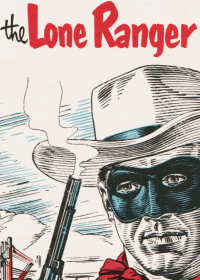
5 episodes of the Lone Ranger (1938)
This is a decent radiodrama. A bit smaltzy and even a little repetitive despite the short number of episodes i listened to. But its interesting how they tell the story since they can't really do action scenes on radio . [3/5]
. [3/5]
Comics Items: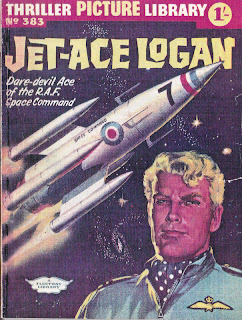
Jet Ace Morgan strip (1956)
aka The Comet, Issue #429. Pity they're multi-part stories and i only got one part . Seems a bit like the star-trek reboot. Cadets are being sent to help stop an invasion of Jupiter. [3/5]
. Seems a bit like the star-trek reboot. Cadets are being sent to help stop an invasion of Jupiter. [3/5]
Jet Ace Morgan strip (1958)
aka The Comet, Issue #511. Only part 2 of 6. Looks interesting though, as the RAF space interceptors try to deal with another invader in the year 2058. [3/5]
Iron Warrior strip (1948)
aka the Funnies Album. That was fun. Imagine if 'Indiana Jones' went exploring while wearing the bad guys mech-suit from 'Iron Man' . [4/5]
. [4/5]
Iron Warrior strip (1950)
aka the Funnies Album. It would be nice if the actual warrior did more, this is really all about his owner. [3/5]
Iron Warrior strip (1951)
aka Cute Fun Album. Both racist and anti-racist at the same time. Still fun . [4/5] 0
. [4/5] 0 -
New Items:

Boy Fortune Hunters in Yucatan by L. Frank Baum (1910)
Well that was even worse than the name might suggest. I'd give it one-star but its not even interestingly awful, its just incredibly average.
Its a cheap imitation of an Edgar Rice Burroughs novel which is remarkable considering how cheap some of his writing usually is . A by the numbers adventure story complete with gadgets, lost civilizations and laughably convenient natural disasters. It also tries to be non-racist but ends up with quite a few Black Hawk Down/Zulu situations.
. A by the numbers adventure story complete with gadgets, lost civilizations and laughably convenient natural disasters. It also tries to be non-racist but ends up with quite a few Black Hawk Down/Zulu situations.
The writing makes the most remarkable of events dull as dishwater and the plot is frankly pathetic.
...you know what i changed my mind, one-star it is. This book really doesn't have any redeemable feature. [1/5]
King Lear by William Shakespeare (1606)
Well i read this play instead of watching it, but i really don't think any acting could improve it. I was quite enjoying it for the first half though.
We're really dropped into the deep end with the opening, Lear comes across like a comedy version of a mafia boss. I was routing for his daughters most of the time. Since we get no background on Lear he just seems incredibly capricious even if you considered his daughters to be the bad guys it certainly feels like they learned their behavior from him.
The scene changes felt a bit all over the place at least on the page. The various characters meandered about a bit too much and a lot of action took place off stage. Also the love-triangle just seemed to come from nowhere and there were too many deaths by heart attack.
Finally, between the mad characters and the fool, it really felt more of a black comedy than a tragedy. I weep not for Lear . [2/5]
. [2/5]
Film Item: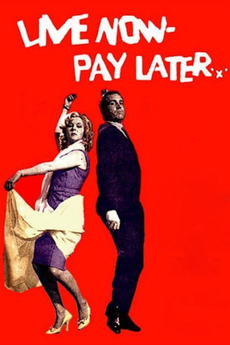
Live Now, Pay Later (1962)
Comedy drama about a door-to-door salesman and serial philanderer. Its really good, with a slightly dark undercurrent. At its center is the idea of people plunging themselves into debt, buying crap they don't need and can't pay for. An idea which might be too strange for a modern audience to understand :P . [4/5]0 -
New Items:
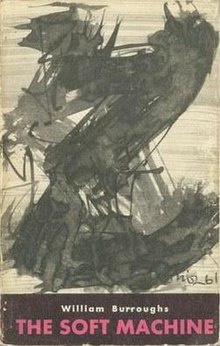
The Soft Machine by William S. Burroughs (1961)
Firstly if you don't think you can withstand frequent uses of the words rectum and jism then you may want to skip this one.
Second, most of this book is written in gibberish, i don't know how others handled that but the only way i could read it is by bypassing the forebrain entirely.
In practical terms i read it really, REALLY quickly (without skimming). I don't mean i read the overall book quickly but rather the individual chapters, sentences and words. I read fast enough that the words went in one ear and out the other without any processing from the brain. Which may seem pointless but as they pass through they leave behind a thin residue of imagery, which is really the only thing this novel has going for it.
Ancients temples, shanty towns, snuff films, cannibalism, body switching, time travel, mind control, gigantic machinery and various Lovecraftian horrors are just some of the sights to see, along with innumerable homosexual encounters (many of which seem highly suspect from a legal standpoint).
I liked the imagery, i'm a big lovecraft fan so many of the horror pictures were interesting for me. The speed at which i was reading also stopped the gay sex from being too repellent. There is also a nice use of repetition which makes it somewhat poetic at times.
This is a novel novel. Novel as in novelty. In fact in one of the later chapters it pretty much states that as a goal. Fighting conformity, different merely for the sake of being different, and as a novelty its pretty interesting but that sort of thing only goes so far with me.
I don't think i'm imaging that the library copy i read seemed much more worn in its first few chapters than the later ones. I'm guessing a lot of people have given up on this through the years. [2/5]
History of Babar by Jean de Brunhoff (1931)
Odd little childrens book. A minor quibble, elephants live in a matriarchi, so not only is this not educational its actively uneducational :P .
I'm sure there must be some other versions of this book but the one i read had hand-written text!, and in cursive! Even i had issues deciphering a word here or there but i can only imagine the horror on a child's face if they were handed this :lol. And their growing horror if they actually managed to figure out what it says .
.
There are several dark moments in this which are not well dealt with to say the least. Also Babar is elected King rather than inheriting it, which seems a nice change... until you find out why he in particular is elected. Part of me wants to think it's a biting satire on elections but i suspect not :lol.
The art's still nice though . [2/5]
. [2/5]
Under the Garden by Graham Greene (1963)
Short story of a man visiting his childhood home and trying to recall a strange incident from his past. Its pretty good, sort of like a Roald Dahl story but for adults. Nice language and nicely weird. The end is somewhat unsatisfactory but i think purposefully so. [4/5]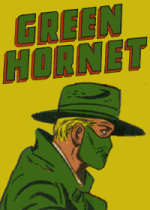
5 episodes of the Green Hornet (1938)
Radiodrama. Pretty good, it does however sometimes seem like listening to a normal tv show that you can't see. Many of the people the Hornet goes after arn't technically criminals they skirt just inside the law so no one official can stop them. [3/5]0 -
Advertisement
-
New Items:
Mardi, and a voyage thither by Herman Melville (1849)
In the authors own words
"...And so is Mardi itself: nothing but episodes; valleys and hills; rivers, digressing from plains; vines, roving all over; ...and here and there, fens and moors.
...Ay, plenty of dead-desert chapters there; horrible sands to wade through."
I've previously read Moby-Dick but i really don't remember it being written so archaicly as this is. This felt so old fashioned in its writing almost shakespearean. It also has a lot of dry humour and witty back and forth repartee which remined me of shakespeare too. But if you're not good Ye Olde talking or don't know your world history, greek myth or the other old timey references that tend to crop up in these kind of books then you may have problems with this. Melville really likes his old timey references as well as his old timey language.
Oh and he also knows how to completely torture a metaphor. If you can't stand a sunrise being described in terms of clashing armies, then this isn't going to be your thing.
This starts off as a high seas adventure story albeit a very languid one. Languid is a word which constantly stalked me through the first volume. It feels like lying on a beach in the sun, slightly drunk, while someone (probably also drunk) tells you a story... a seemingly endless story. One which you'll probably drift in and out of.
Still i thought it was better than Moby-Dick for the first 3rd of volume one. All of the 'voyage thither' part basically.
It still goes off on numerous tangents like Moby-Dick, but in that book there was a clear goal, so every tangent was annoying as it was getting between you and the point of the book. However the goal in Mardi is a lot less clearly defined and therefore the meanderings less frustrating.
Also there's no were near as much whale biolology .
.
Finally though we make it to Mardi and things slow down even more, i don't even know what the point was and i don't think the author did either. Up until the end of volume 1 it was a realy slog and author didn't seem to know what to do next.
On to volume 2! Ah the author finally made a decision... and that decision was just to change genres completely.
Seriously, while there is a thin veneer connecting this to volume one its really a different type of book entirely. We're now in the realm of pure satire/allegory, and incredibly obvious allegory's at that, apart from a couple of obtuse moments where i couln't figure out what the hell he was talking about..
We have 10-15 chapters taking shots at organized religon, then we're off for a trek round the entire world covering the irish rebellion, french revolution, opium wars, american civil war etc. With occasional stops at the evils of civil law, the nature of human consciousness, how awesome smoking is, beauty being in the eye of the beholder etc.
Also at least two chapters of apology and excuse, pointing out that its really hard writing a book which is where the above quote comes from. I like the honesty but if he'd just written something better he probably could have skipped those parts .
.
And the ending... i didn't see that coming and i'm still not entirely sure what the point was but interesting at least. [2/5]
Orlando (The Marmalade Cat) Buys a Farm by Kathleen Hale (1942)
I feel like i'm being a bit cruel giving this one star, its not offensive in any way, however we live in a big wide world and there's so much else you could be reading.
This is about cats that drive, talk, wear clothes and now run a farm. If that sounds cute and magical, prepare to be disappointed .
.
There are several anachronisms which would not work at all for a modern audience but the main problem is the writing. Almost every sentence is a statement, there's no flow to it at all. In fact at times it feels like the script was much longer and then brutally stripped down. Or maybe the pictures were done first and then the story was just made up based on them.
Whatever the problem the language completely removes any sense of wonder or character from the book. Pointless. [1/5]
Comics Items: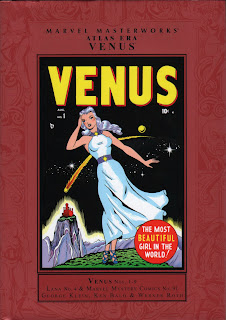+a.jpg)
17 issues of Venus the comic (1948)
The goddess Venus comes to earth and falls for a mortal. This starts out like 'I Dream of Jeannie' or 'Bewitched' but over time Venus' powers are reduced and the supernatural element emphasized. It passes through a sort of 'Buffy'/'She Wolf of London' phase before ending up more like 'Kolchak the Night Stalker' :P . An odd duck but pretty interesting. [4/5]0 -
New Items:

The People of the Pole by Charles Derennes (1907)
Really nice early sci-fi, reminded me a lot of my favorite H.G.Wells novel the 'First Men in the Moon'.
There is a lot of different aspects to this one. Apart from some really quite interesting sci-fi ideas there's also a good bit of humour to be had, mostly derived from the 'odd couple' main characters. Then at other times we have a quite Lovecraftian horror of the strange, a good bit of social commentary and quite a different brand of visceral horror mixed in too.
I did find one or two dry spots, when the people of the pole are being described in detail and also the start of the epilogue but things picked up again after both of these dips and the very end was quite funny, dark and interesting all at once.
The BlackCoatPress.com edition has the usual amount of silly typos that seem to plague that publisher and the translation felt a little off at times compared to some of their other books. However this might also be my favorite of the half-dozen or so their titles i've tried.
If you like your early sci-fi or adventure stories this is a really good one. [4/5]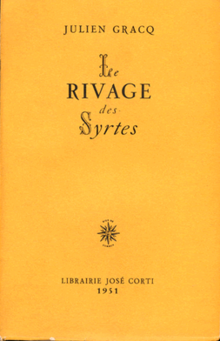
The Opposing Shore by Julien Gracq (1951)
So in premise this reminded me a lot of the excellent Tartar Steppe by Dino Buzatti. Both are about young men sent to remote outposts where the odds of anything exciting happening are quite remote but vigilance is nevertheless required.
You could easily change the setting of these stories to say a nuclear missile silo in the usa and the stories would still work pretty well.
However the Opposing Shore diverts completely from the Tartar Steppe in certain areas which i can't really talk about without spoilers.
So firstly i need to address the language. This is the best and worst part of the book, its soooooo overwritten and yet leaves you with many ambiguities and uncertainties. Even right at the end another one popped up so that i'm really unsure how to interpret the conclusion.
But the descriptions... I really like purple prose, make it as over the top as you like i'll just lap that stuff up normally. This however was a bit too much even for me.
There can be a page or two of metaphors and similes describing a single item or event. There are metaphors within metaphors. Again i like purple prose and i did enjoy a lot of this but it is really pompous and highbrow at times.
Then there's the message of the story which like everything else left me uncertain. It seems to be about the individual versus history. Does any one ever really make a decision? or does history, the collective unconscious if you will, force events regardless of individual wishes?
Its the former, done .
.
I feel like english professors could argue about the meaning of this book for months but part of that is again the sheer uncertainty of what the hell actually happened at certain points.
There is a lot to like here don't get me wrong, but it is a bit drowned in the over the top style. Definitely not for your average reader. [3/5]
The Conquerors of Idols by Charles Derennes (1908)
Short story, seems a bit like the 'Man Who Would be King' or at least the vague fragments of that film i saw as a child. [3/5]
Arabian Nights, City of Brass by unknown (900AD)
Short ok fairytale the main crux of which seems to be, everybody dies. Spends a bit too long describing shiny objects. [2/5]0 -
New Items:

Down with Skool! by Geoffrey Willans (1953)
Funny school guide. Although set in a british boarding school of the 50's there is still a lot of things which are familiar. The entire book however is written in broken english which can get annoying at times.
Overall pretty enjoyable and strangely subversive. I never would have thought that this was written in the 50's, seems much more like a product of the early 70's. [3/5]
The Thinking Machine by Jacques Futrelle (1907)
I've been pecking away at this collection over the last couple of years. Occasionally good, occasionally absurd, nothing that will change my overall opinion of short detective fiction. [2/5]
16 issues of Ace Hart (1948)
Derivative superman-type comic. Not only that but most of the stories are clearly old detective, adventure or western comics given the barest rewrite to fit a superhero in. Awful.. just... awful. [1/5]
Film Item:
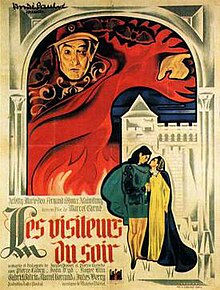
Count Yorga (1970)
An incredibly cheap and seemingly average modern vampire tale. Complete with the vampire wearing what looks like the same clothes as Christopher Lee's dracula.
However! despite the silly costume it's also amazingly disturbing, with the vampire coming across as some sort of pervert serial killer.
A weirdly gritty tone at times and the cast have great chemistry. [4/5]
Les Visiteurs du Soir (1942)
aka the devil's envoys.
Two damned souls, in the guise of minstrels, are sent by the devil to cause chaos in a medieval castle. Supernatural romance, reminiscent of the Masque of the Red Death (1964) film. [4/5]0 -
New Items:
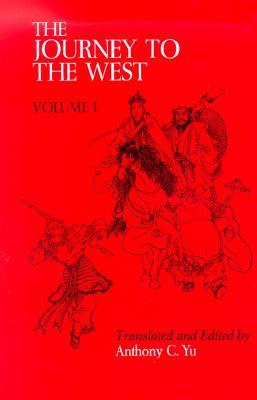

Journey to the West, Vol 1 by Wu Cheng'en (1592)
A monk and his 3 supernatural disciples set out on a journey westward to obtain buddhist scriptures. Actually that description is the story eventually... there's quite a bit of build up and background to get through first.
So there were a few surprises in this for me. Firstly while it might well be based on ancient legend this isn't some oral tale which has simply been written down but rather a proper literary piece from the 16th century.
Which is quite recent from china's point of view. I find it quite difficult to read fairytales so was quite glad this wasn't one.
Secondly i'm a big fan of the tv adaptation of this 'Monkey'. It was a 70's show made by japan rather than china* and then dubbed into english by people who often didn't even have a script, they would just make up the story based on what seemed to be happening on screen.
For all of these reasons i assumed that the book would bare little resemblance to the show, but i was wrong. All the crazy, funny ridiculousness of the show is totally in here .
.
The comedy and satire is Rabelais-esque at times.
About a 5th of the story is done in poetry. I don't know whether this rhymed in its original language but it doesn't now. It still has a certain rhythm about it though. I might have disliked the poetry except that it only occurs on specific occasions.
Its basically a descriptor. Whenever someone or something new turns up or when there's a fight sequence it switches to poetry and the poetry is usually more over the top than the prose.
Its like in certain movies or shows where they might switch to animation for fight sequences, or in certain kinds of musical where the songs are only used to replace fight or love scenes.
The story can get a bit repetitive both figuratively and literally. Literally in that every so often you get a little recap of events. One character will go off and do something, then comeback and tell people what they've just done.
I didn't mind this so much as it was never very long and did make me remember things a bit better.
The other repetitiveness is a little more annoying as several of the fight sequences follow a very similar pattern which can start to get old.
Oh, one other thing that some might find annoying is the buddhism. There are various pieces of buddhist philosophy in this which will make no sense to most people.
I don't even know if their real. Its like quantum theory, someone could be telling you a real but confusing piece of quantum theory or a fake bit, i simply don't have the necessary experience to tell the difference.
Anyway, i was constantly hearing the people from the tv show in my head (aswell as picturing the very pretty monk ) so i feel like i may be more naturally inclined to like this over people who didn't see the show.
) so i feel like i may be more naturally inclined to like this over people who didn't see the show.
I look forward to reading the rest of the volumes but not right away, i think a break between each one is a good strategy.
*the male monk is played by a female actress on the show which caused me considerable confusion as a child . [3/5]
. [3/5]
To and Again by Walter R. Brooks (1927)
aka Freddy Goes to Florida
A group of farm animals decide to go south for the winter. I prefer the original title 'To and Again' as Freddy the pig is probably the most underused of any of the animals in this.
It took me a while to get into. It didn't feel much like a kids story, i kept having flashbacks to 'Animal Farm' which didn't help .
.
One of the problems is that there arn't really any child characters. All of the animals except for the pig have the personalities of grownups which is why it felt a bit too grounded and the humour seemed aimed a bit older. Thats probably why the pig ends up as the centerpiece of the franchise as he's the only possible child-avatar available.
For a while things plodded along and i wondered how the author would reconcile the human world with these hyper-intelligent animals. Things came to a head in Washington DC in what seemed like pure satire but the author was now stuck with that strange turn of events and the book was the better for it.
Not much time is actually spent in florida and while my knowledge of the U.S.A isn't great i suspect there are some geographical errors here .
.
I also have to say that a couple of events towards the end would definitely have proven fatal (and smoke doesn't wake people up!) so if reading to a child make sure to point out how homicidal these animals are :P .
Overall a bit drab but there were wacky incidents that improved it as it went along. [3/5]
Film Item:
The Ruling Class (1972)
Very twisted black comedy. The inheritor of a large estate believes that he is God. Complete with musical numbers and cameo by a gorilla wearing a top-hat. About 1 hour longer than it needs to be though. [3/5]0 -
New Items:
Nova Solyma by Samuel Gott (1649)
In two Volumes.
Vol 1: 3/5
Vol 2: 2/5
Written anonymously and attributed for some time to John Milton, now generally believed to have been written by Samuel Gott.
It was also written in Latin, which given the amount of time it spends trying to convert the reader, seems almost literally like preaching to the choir .
.
I mean that would be like a new Star-Trek novel being written entirely in Klingon :P .
The basic premise is that jewish people have been converted to christianity and that has somehow allowed them to regroup as a people and take back Jerusalem and surrounding areas.
The frame story involves two englishmen who come to one of these new jewish/christian cities and are shown around.
Its technically a christian utopian piece along with the likes of much worse Utopia by Thomas More or The New Atlantis by Francis Bacon . Actually though the breakdown goes more like Utopian fiction 20%, Religious/Social Lecture 40% and Story 40%.
As well as the frame story there are a number of sub-stories and poetry bits, involving disguises, bandits, love affairs, pirates etc.
Some of the lectures deal with religious minutia which bares a striking resemblance to physics lectures at times.
Its morality is as suspect as one might expect from this time period, sexist and very classist. But its flaws and obvious hypocrisy were generally interesting. The last third was a bit more of a chore than the rest.
Three stars might be (correction, definitely) being generous but then i've read a lot of similar works which were much worse . [3/5]
. [3/5] 
Billion Dollar Brain by Len Deighton (1967)
A really good spy novel. A little bit airy and light and certainly quite funny. However its not a comedy, there are some pretty absurd characters but i have a feeling they're probably more realistic than we would want them to be .
.
Most of the humour comes from sardonic and cynical main character. Although there are some action scenes its mostly more realistic and low key than something like Bond.
Perhaps a little convenient at times but not too much and i wasn't too confused about what was happening which is always a danger in detective or spy fiction.
Everything was also quite easy to picture the style of writing being quite descriptive. Occasionally you'd get these almost stream-of-consiousness burst of description which were a little jarring from the rest of the writing but it was a quick and effective way to add detail to certain scenes.
Overall really enjoyable and clearly well researched and i think i might well check out some of Deighton's other books. [4/5]
Dick Donovan, J.E.Preston Muddock (1892)
Ok locked room mystery with some modern-ish drug elements. [2/5]
5 issues of Janus Stark (1969)
Comic set in victorian london. The various adventures of a contortionist escape artist. [3/5]0 -
New Items:

Island of Captain Sparrow by S.Fowler Wright (1928)
I lost the forst draft of this so short version. An odd mix of fantasy and high seas adventure. The plot of a pulp but much better and more thoughtful writing style.
With its mix of perspectives to the tell the story and the history of this mysterious island it reminded me of the series 'Lost' and not unlike that show the build up meant i was somewhat disappointed by the end.
But its still really quite good, pretty decent romance and adventure i thought, some racism but mostly in the subtext.
Its mysteries while not explored to the extent you would want will mean i won't be forgetting it anytime soon.
In the end really good and the 3 stars are mostly due to the high expectations it gave me from its early chapters and never quite fulfilled. [3/5]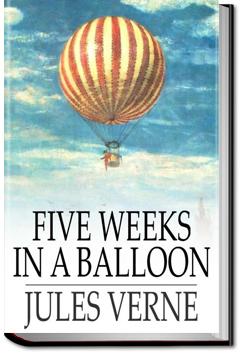
Five Weeks in a Balloon by Jules Verne (1863)
A fairly solid entry in the Verne catalogue. He does manage to make a ballooon trip more interesting than i expected.
There's also a lot of information concerning the history of african exploration which was informative as always with verne.
I don't have enough science knowledge to support or pick apart vernes version of a balloon but its not your standard hot air type used today.
Our three main characters all well drawn and there's some humour to be in their personalities. The first half seemed a little too easy but things got more intense and interesting later on.
Not much more to say. I wouldn't really recommend it as one of Verne's best but certainly not one of his worst either. [3/5]
Film Item:
7 episodes of Fireball XL5 (1962)
Setting aside the 50's sexism, there's a lot of 50's sci-fi charm and marionette charm in this. However the pacing of the show is so slow i found it quite difficult to get through each episode. [2/5]0 -
New Items:

The Kingdom of Agarttha by Alexandre Saint-Yves d'Alveydre (1886)
I thought this was a hollow earth novel but rather it is a religous/conspiracy theory bit of nonsense. It's actually the third book in a series so a lot of its buzzwords and terms must have been introduced in the previous entries.
Imagine the kind of religious pamphlet handed out on street corners, combined with some rejected scripts for Ancient Aliens and the assortment of scribblings police tend to refer to as a Manifesto after they've retrieved it from the serial killers home. That should give you some idea of what we're dealing with here.
The basic premise of this would be belief system is that all religions stem from a single point in this case a mostly underground kingdom of about 15 million people. This civilization is of course perfect and advanced beyond the rest of mankind.
Like scientology and other cults access can only be granted in stages and of course the author can't tell us anything provable until we're willing to accept his religion without proof.
Also accepting this religion is the only way to save europe from the chinese or something.
There's some mildly interesting details like that the Agartthan's found some dragons and bird people underground somewhere, and also they eugenically engineered a weird tortoise thing with eye's on its legs and a foot pointing in each compass direction.
There is one good thing i got from this though, we are currently dealing with a global problem of people believing that facts are negotiable and reality is whatever they want it to be, which is pretty disheartening and even scary, but this work from the 1880's at least shows that its nothing new . [1/5]
. [1/5]
The Suicide Club by Robert Louis Stevenson (1880)
A trilogy of short stories based around the suicide club. The club is only really explored in the first tale and it a pretty interesting idea. One of those ideas you might see used in an episode of the Twilight Zone, Black Mirror etc.
It doesn't really get examined as much as i would of liked. The other two stories come across as more detective style fiction. The writing is good throughout but the perspectives from which the stories are told are both a good and bad thing.
Th problem is that if your paying attention then you can tell whats going on which removes a lot of the mystery on the other hand if you weren't paying attention then things are REALLY confusing.
Overall an interesting set but not as good as i was hoping given the initial setup. [3/5]
Film Item:
Yellow Submarine (1968)
Animated musical, Pepperland is under attack from the blue meanies and needs musical assistance. Some sequences are a bit nauseating and goes on too long, also only a few good songs but not bad. [3/5]0 -
New Items:
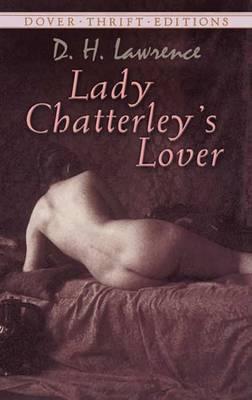
Lady Chatterley's Lover by D. H. Lawrence (1928)
Well that was ok. Certainly not the scandalous romance i was anticipating. Its about as much of a romance as Moby Dick is a high seas adventure.
Firstly the scandal aspect is not what you'd think, in fact affairs seem to be almost expected in this world especially with the female character who is raised in a pretty bohemian atmosphere. As for the romance, the main characters don't even seem to like each other that much, its all very down to earth and realistic... on one level anyway.
On the other hand the writing can be completely overblown. The love scenes in particular made me laugh out load at times because of the pomposity of the language.
What this book is really about is just Life, and finding a meaning in it. The discussions of money, sex, love, intellect, industry etc. feels like the stuff you'd talk about while drunk in a college bar.
The main problem i have is that despite all the time the author takes telling us how people feel, i still never got a sense of who they were. The characters seem to shift personality constantly and it always seemed like you were looking at them from a distance, i never felt like i really knew any of them.
Anyway there are many interesting aspects to this but not a fan of the writing and like Moby Dick, perhaps just too many angles to it, not focused enough for my liking. [3/5]
Ardistan and Djinnistan by Karl May (1909)
So this is an interesting one. Basically its a pulp adventure story, complete with betrayals, wars, rebellions, secret tunnels, death traps, princess-like-figures etc. but crossed with a political and religious allegory.
Pulp adventure fiction and religious allegory are not two things one tends to see a lot in the same place .
.
Style-wise it feels about half-way between H. Rider Haggard and Edgar Rice Burroughs. Also a lot of the story involves trying to convert a ruler to being nice, and so it starts to feel a bit like 'A Christmas Carol' in places.
The basic plot is that the country of Ardistan is about to wage war on Djinnistan and the Galadriel-esque ruler of a neighbouring country wants to stop the war. So she sends two agents to infiltrate Ardistan and find a means of doing so.
All sorts of religions are represented in the book and it mostly seems like its tolerating all of them but the author can't help letting his christian leanings get the best of him at times.
Also the way the plot progresses you start to see that our heroes are only a small part of what seems like almost a CIA plot to deal with Ardistan. I think modern readers might well question some of this interference in a foreign country however well intentioned.
Its an odd duck of a novel, at its heart its still a decent bit of adventure fiction but the religious preaching and pulpy adventure don't always sit well together.
Also due to the religious nature of the work there is a certain amount of predestination and Deux Ex-Machina's about. However there almost always is with these kinds of adventure stories and i've seen many, Many worse uses of such elements in other pulp adventures . [3/5]
. [3/5]
Film Item: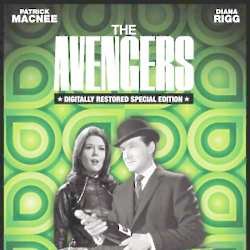
5 episodes of The Avengers, Season 4 (1965)
Nice chemistry, decent mix of humour and action, interesting sci-fi/spy plots. But don't love the scripting and stunt sequences pretty terrible. [3/5]0 -
New Items:
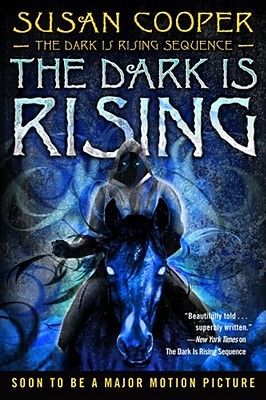
The Dark Is Rising by Susan Cooper (1974)
Pretty decent boy-wizard story but i preferred the previous book Over Sea, Under Stone, which had less magic but more adventure.
This suffers from the usual Chosen One problem, too much predestination which undermines the tension of the story. Also it's a bit video-gamey. The plot involves collecting magical items and at one point something happens which i can only describe as Leveling Up, it took all my self restraint not to shout 'Level 2' Achievement Unlocked: Generic!
The other problem i had was that its really dark in tone in the first half, it felt like a kids version of The Omen or something. This dissipates significantly once the character Levels.
I know i sound like i'm trashing it but the writing is generally very good. The protagonist has a big and functional family which was interesting and not something you tend to see much of anymore.
I actually thought i might have to give it 4 stars, as the third quarter was really compelling and uncertain, but things felt more predestined again towards the end.
So not bad at all, really nice writing but not great plot. [3/5]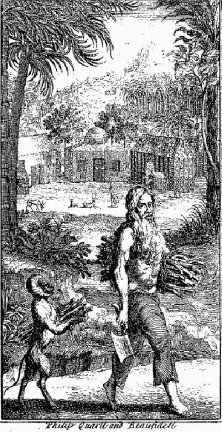
The English Hermit by Peter Longueville (1727)
As 18th century Robinson Crusoe knockoff's go, this was a fun one (i've just realised this was published only 8 years after the original). The main issue this author seemed to have with Crusoe is why anyone would want to leave such an island. So this book is all about how much better it is to be away from the cares of the wider world.
(i've just realised this was published only 8 years after the original). The main issue this author seemed to have with Crusoe is why anyone would want to leave such an island. So this book is all about how much better it is to be away from the cares of the wider world.
There are several other differences too. Our protagonist is much more obviously flawed than Crusoe being a bigamist and in fact several of his dream sequences seem to have rather attractive women in them.
Although on one level just as religious as crusoe its a more general and less dogmatic faith, almost philosophical rather than religious. His dreams also tend to have more of a Greek myth flavour than christian. Father Time appears in several of them and Mother Nature in another, she's apparently really hot and has 3 pairs of breasts, did i mention he likes women? .
.
Theres some pretty interesting descriptions of wildlife on this island including monkeys, one of which becomes a sort of servant, yay monkey butler! .
.
The island is not in the middle of nowhere as you might expect but relatively close to a coast, protected simply by the harsh reefs surrounding it. This is a cannibal free zone but our protagonist does have some incidents with nasty french fishermen. Which while not physically dangerous are both quite moving and also a little funny.
Like a lot of stuff from this era the writing can be a bit plain and monotone on occasion but was decent overall and the book isn't too long. [3/5]
Film Item:
Red Planet Mars (1952)
Really nice cerebral sci-fi movie, with Cold War and religious implications and some nice twists. [4/5]0 -
New Items:

Lint by Steve Aylett (2005)
Wow...let me try to collect my thoughts. I was quite close to giving this 4 stars, or 2. This is a biography of a fictional writer. One of those fringe experimental types.
Take every parody you've ever seen of the kind of people who make one man shows, or do performance art. Mix in William S. Burroughs using his cut-up technique, a dash of Lovecraft, add a sprinkling of Andy Kaufman, maybe a touch of Alan Moore, Hunter S. Thompson or Michael Moorcock during his Jerry Cornelius writings. Oh and pour in some of Frank from the film 'Frank'.
So to try to find the point i lost somewhere above. This is a biography about a guy that writes complete bollocks. I mean it is the worst kind of 60's experimental garbage. Its a very well told bio, and is best when it interweaves with the real world.
The problem is that all the quotes from Lint are such nonsense, somehow even the fact that this is a satire doesn't lessen their annoyance... and yet and yet. After about a third of the way through i actually found some of the nonsense making sense. I can't tell whether the author was getting less obtuse or the text actually rewired my brain.
It helps that tv and film are mixed in, did you know Lint wrote an used script for the Star-Trek animated show? He didn't because he's fictional but still .
.
By the end i think i'm adding this to my reread list if only to see if the first third is still as annoying. If you've ever read any surreal or really artistic or experimental fiction, or experienced that kind of stuff in film, music or theatre then you might get a kick out this.
Or you might want to hunt down the author and club them to death with an imaginary wedge, or maybe both .
.
I think this might be the least insightful review i've ever written :lol. [3/5]
The Man in the Moone by Francis Godwin (1638)
A short bit of what i guess is early sci-fi. I've read a number of things similar to this like Lucian's True History, Empires of the Sun and Moon by Cyrano de Bergerac or Voyage to Cacklogallinia but all of those are satires or comedy and so avoid being classed as sci-fi.
So this is sci-fi by virtue of not being interesting enough to get into another category.
There are occasional elements of interest but overall not really much here.
I'm not even going to mention any of the content as there is so little of it, spoiling any would further reduce what you might get out of the novella. [2/5]0 -
Advertisement
-
New Items:

A Modern Lover by George Moore (1883)
'He was.. bad only because he had not strength to be good'
So this is a very Hollywood novel despite being set in 1870's London. The plot, a young artist moves to the big city but finds it hard to make his mark.
Hence why i describe it as Hollywood-like. Its all about celebrity and talent and trying to be one of the few to succeed.
Interestingly though, unlike most of these kinds of stories our hero isn't all that talented, he's the artistic equivalent of a soap actor he's really not in it for the art either but simply the fame and fortune.
The novel follows the up's and down's of his career and the various women who he uses along the way. Like Hollywood the art industry is often about who you know and this guy has no problem using the various women he meets to open doors for him.
It's a very realistic novel and all of the characters are well drawn. You never really hate the protagonist, he's quite a practical guy really, sleeping his way to the top. This would definitely be written with a gender reversal if done today so its nice to see a man in this position.
There are a few downsides. Its a little longer than i think it needs to be and the story moves in and out of focus.
So at times its an intimate piece and then it moves to a more distant narrator view and then back in again. So there are times when you feel like your losing touch with the characters. Also probably due to this method of storytelling it occasionally feels like people change their minds and opinions a bit to suddenly.
Overall though a pretty interesting story, good characters, its social scene including tennis matches make it feel like its set in the 1920's at times rather than the 1870's. Speaking of which there's quite a few similarities with 'Lady Chatterley's Lover' in places.
A surprisingly realistic and very unromantic romance, written with a sort of cynical glimmer in its eye. Also some good discussions of Art and how public taste changes over time. [4/5]
The Golliwoggs Air-Ship by Florence K. Upton (1902)
Yes there is a golliwogg here so flee now if that without context is enough to put you off.
Another beautifully illustrated adventure starring the intelligent, brave and charming Golliwogg and his 5 lady friends, the Dutch Dolls.
Golliwogg returns from Paris having learned about hot air ballooning and its not long before he and the ladies have built their own.
Unfortunately what follows is really nothing but a sequence of near death experiences that quite terrified my inner child. The wonderful drawings really emote when the Dolls are balling their eyes out and really capture the looks of horror on their faces.
I know Disney pulls this crap all the time and of course everything works out all right in the end (also i'm running a temperature of about 150 at the moment) but still i really could have done with a little more joy and a little less terror.
So not as good as the other 2 of books in this series i've read but still well versed and drawn. [3/5]
8 issues of Animal Comics (1942)
Really fun comics featuring both looney tunes-style talking animals and some Lassie-like stuff. [4/5]
Film Item:
The Fly (1958)
Well i wasn't expecting this to be a murder mystery but still. Quite good despite the occasional awful dialogue or music choices. [4/5]0 -
New Items:

Plutonia by Vladimir Obruchev (1915)
Well that was disappointing. A book very much in the vain of Journey to the Center of the Earth, The Lost World, the The Land That Time Forgot etc.
However unlike Journey to the Center of the Earth this is a true Hollow Earth novel with all of the geological absurdity that that implies, which is one of the few interesting aspects of the work.
The other good points are that its russian which (on very rare occasions) makes it feel a little different. Also there's some decent repartee amongst our protagonists at times.
Finally there are a few moments of interest towards the end of the novel.
The other 80% or so is unfortunately pretty boring. The writing is basic, and it gets pretty repetitive. See interesting creature, shoot interesting creature, have creature for dinner, rinse, repeat.
Even our hero's actually get bored after a while, and if people are bored with dinosaurs then there's clearly something very wrong .
.
Not well written enough compared to earlier works and not action packed enough to compare with the pulps. [2/5]
A Traveler from Altruria by William Dean Howells (1893)
Utopian fiction, without the utopian part of it :P. So this entire thing is done as a series of conversations, its like one big lecture so not great.
Its a fairly easy read though and since its about the gap between rich and poor its still relevant today. In fact i would say too relevant, or at least too familiar.
There are things of interest here. The writing is easy and witty at times. There's some some very blinkered sexism which you can laugh or wince at. Plus a brief mention of a mega-corporation controlling all aspects of a country, perhaps one of the first appearances of such an idea.
However i'm getting more discerning with every book i read and in a world of infinite books i felt like deducting a star. [2/5]0 -
New Items:

The Last Tram by Nedim Gursel (1991)
Well that was really rather good . I suppose this is technically a set of short stories, although they're so short i'd describe them more as tableau's or vignettes.
. I suppose this is technically a set of short stories, although they're so short i'd describe them more as tableau's or vignettes.
This is a writers book, written for the sake of writing not reading and its rather glorious. A mix of autobiography, fiction and weird fiction. Its about love and sex, loss and loneliness.
From the writing i've deduced the author was exiled from Turkey for some years and that sense of wanting to come home is prevalent in more than a few of the tales. Really nice writing style, the translator i'm guessing did a very good job.
I preferred the weird fiction bits the best and could have done with a few less stories revolving around the authors many amorous encounters but overall very nice album. Thats really what it feels like, a real indie album with the most random assortment of styles and genres but all clearly by the same musician. [4/5]
The Indiscreet Jewels by Denis Diderot (1748)
"such is shall i say it.. the ungrateful nature of Toys, that they never take the good-will for the deed"
Well that made me laugh quite a bit. An 18th century comedy/satire. It features Mangogul king of Congo, loosely based on Louis XV, who asks his wizard for something that will make women tell him the truth.
He receives a magic ring that causes vagina's to speak because that apparently is the only honest part of a woman... ok so not the most pc thing in the world . Surprisingly though i didn't find it as sexist as i thought i would. The author is at times quite moderate, he tends to present multiple viewpoints and mock either extreme.
. Surprisingly though i didn't find it as sexist as i thought i would. The author is at times quite moderate, he tends to present multiple viewpoints and mock either extreme.
There's a lot of witty banter and the writing style is a highlight for me. There are some downsides in that some of the humour is definitely topical and doesn't hold up, but i laughed a lot more reading this than Don Quixote or Gargantua and Pantagruel.
There's also some hilariously subtle filth. On at least a few occasions it took me a minute to parse the language and found something very naughty, and for each of those i spotted i imagine a few more probably snuck past me.
The first volume is better than the second, it almost approaches sci-fi, as people know about the talking vagina phenomenon but don't know the cause. Which leads to all sorts of different effects on society.
The scientists, philosophers and priests all have theories, people start selling vagina muzzles to shut them up etc.
The second volume is a bit more hit and miss, there are various discussions of art and other subjects but it starts to feel a bit repetitive and ultimately you find there was never any great over-arcing plot. It just sort of ends.
Still, if you can parse the Ye Olde language this is quite a fun one. [3/5]0 -
New Items:
.jpg/200px-Gladiator_(novel).jpg)
Gladiator by Philip Wylie (1930)
This was pretty stunning. I knew that Superman took some elements from Doc Savage but it stole even more liberally from this, however i also saw elements of Spider-Man and many other superhero stories, there's even a little Teen Wolf too.
So its a superhero story, or rather THE superhero story, i can't stress how bizarre this is to read as being from 1930 its essentially inventing the superhero genre but its also a deconstruction of the superhero.
It is at times light and even farcical but it has sex, violence, blood, death, despair and prostitutes. It simultaneously has as much in common with the 50 years of bright and shiny Super-Man as it does with Watchmen and all of the 'dark and gritty' superhero's of today.
It is the Alpha & Omega of superhero's. Somehow encompassing the entire genre and here it is written in 1930, amazing.
I'm generally not a fan of 30's writing its a little plain for my taste, so this is like if the 'Mona Lisa' was done in crayon, i ended up listened to most of it on a Libravox recording.
A really fascinating read for any fans (or enemy's) of the Superhero genre. [4/5]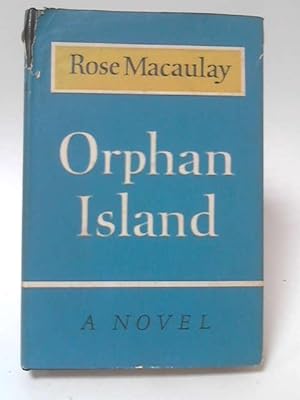
Orphan Island by Rose Macaulay (1924)
"Will it seem, in its 1923 stage of knowledge, as.. backward.. as it did to those who broke into it after its first seventy years of segregated history?"
That was ok. The plot, a group of orphans and a couple of adults are stranded on a desert island in the mid-1800's.
In the 1920's a rescue party of sorts finally arrives and finds this society based on victorian values. Its a bit like one of those Star-Trek episodes where they end up on Roman planet or Gangster planet or something.
It really makes fun of the class distinctions and history of britian but its a fairly narrow book. It just has that one idea to carry the entire work.
And as to the quote above, YES is the answer. While it tries to take apart class disparity it is still pretty racist and with no appealing female characters despite its female author.
I found the writing a bit odd, its descriptive parts are quite florid compared to the rest of the text. So its normal, normal, florid flourish, normal normal normal florid etc. Its not good odd or bad odd, i just found it odd.
The story moves pretty quick and has some humour to it, mostly dark humour from my point of view.
I was a little surprised their was so little mention of WWI. I kind of expected that to be a major demarcation point between the victorian society and the people of 1920 but it barely got an acknowledgment. [3/5]0 -
New Items:
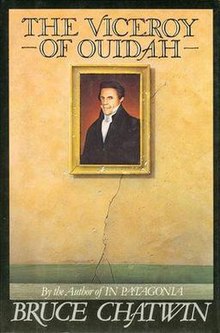
The Viceroy of Ouidah by Bruce Chatwin (1980)
Pretty decent novella. Originally intended to be a non-fiction biography of a famous slave trader. The author felt he hadn't managed to get hold of enough facts so changed a couple of names and published it as fiction.
A very rich and vivid descriptive style. But its still essentially a biography an i'm not a big fan of bio's.
Many books are more fun to 'have read' than 'to be reading' this is the opposite. Fun to read due to the style but didn't feel like i took away too much from the experience. Also quite short. [3/5]
The Phoenix and the Carpet by E.Nesbit (1904)
So this is a direct sequel to 'Five Children and It', so if you havn't read that first this might seem a bit odd in places.
I think i rated both books the same, this is superior in places but has a harder time trying to find reasons for things to happen and struggles to avoid repeating itself.
There's some jokes which might appeal to adults rather than kids in places so not a terrible thing if your reading it to someone.
Overall not a huge fan but entertaining enough. I listened to some of it on a very good Libravox recording by a Helen Taylor. [3/5]
The Witches of Eastwick by John Updike (1984)
So firstly, this bares as little in common with its film adaptation as 'The Stepford Wives' soooo... not a lot. Unfortunately this isn't the boon you might think it is.
Set in the sixties and with certain feminist (or attempted feminist) undertones it does actually have a certain 'Stepford Wives' vibe at times, mixed with the 'Master and Margarita' perhaps. However its far inferior to either of those.
Its main problem is that nothing happens... i mean Nothing! There was a few moments of interest at about 4/5's despite the main characters seeming to completely change their personalities, but that faded fast.
The writing style is truly awful, it is both overly specific and yet still somehow incredibly vague. I have a pretty good ability to picture events from books but with this it was always a half-formed image.
The author uses the most ridiculous metaphors and combines them with nested sentences. You'll often have the start of the sentence the weathers but quite nice here lately i've been watching some of the tennis then a few extra sentences in the middle before getting back to the point :P .
But the main issue is simply that it feels really pointless. Half-formed characters with a half-formed narrative. To steal some shakespear 'full of sound and fury, Signifying nothing' but with only a very small amount of sound and fury . [2/5] 0
. [2/5] 0 -
New Items:

Land under England by Joseph O'Neill (1935)
Well that was really something. I was expecting 'Journey to the Center of the Earth' but instead got a dystopian story in the vain of the 'Time Machine' (but much better).
A really nice original dystopia and deep psychological examination of how it came to be. This is when the book is at its best. The more our protagonist begins to understand this lost civilization the more interesting it becomes. For a brief period its a truly great novel before dropping slightly back to just really, really good .
.
Unfortunately the author isn't great at descriptive writing, combined with the bizarreness of the location this meant i had a hard time picturing the story at times. Luckily this is mostly only an issue at the start and end of the book as the dystopian elements don't really require the same sort of visuals. In fact much of the story relies on the lack of any visuals in this underground world.
As i said one of the times i would have liked a more descriptive style is at the end and this is also when the novel takes a hard left turn. The ideas it raises are much different from the dystopian elements used before and it almost feels like you've wandered into a different story, although not a bad story, its just a bit jarring. I also felt the ending used a bit too much writing as the author tried for a really dramatic climax.
In any case is you like things like The Time Machine, A Crystal Age, Herland, Erewhon or similar fare, this is an excellent read, it also has a certain Kafka-esque quality at times.
A deeply interesting dystopia in the trappings of a Hollow-Earth adventure novel. [4/5].jpg/220px-CatsCradle(1963).jpg)
Cat's Cradle by Kurt Vonnegut (1963)
Dark, potentially apocalyptic comedy in the vane of Dr. Strangelove or the Mouse that Roared.
From very early on i was expecting to give this 4 out of 5 at least. The Only other Vonnegut i've read is Slaughterhouse-Five and this was much lighter and easier to read. I gobbled up the tiny chapters and was really enjoying myself.
Not quite sure what went wrong. Perhaps my expectations were too high, or the heavy foreshadowing just robbed the denouement of some of its impact.
Another case of anticipation being more enjoyable than gratification. Still its pretty fun and its not a terrible ending just not as good as i was hoping for. [3/5]
The Legend of Sleepy Hollow by Washington Irving (1820)
Short funny tale. Not a lot to it but good characterization and descriptions. [3/5]0 -
New Items:

Simplicius Simplicissimus by Hans Christoffel von Grimmelshausen (1669)
A very mixed bag of story. Its split into five sections plus some extra stories which we'll call the appendix but before getting into the parts a brief general overview.
So the writings good and very easy to read at least in the translation i had. I think the translator is a 'A. T. S. Goodrick', i got it from Project Gutenberg.
Its mostly a biography and history with satire and comedy elements, there tends to be some quite witty lines every so often.
One of the best things is the sprinkling of whackiness, once in a while a wizard, fortune teller, ghost, witch or other bizarre character will show up in this otherwise normal story, which for me was always a pleasent experience.
Sidenote, the version i had skipped a couple of pieces, one involving our hero seducing some women and the other a trip to an underwater kingdom! Really! of all the stuff that could have been left out of this he skips the fish people.. that was annoying.
Oh yes before i forget this is set during the Thirty Years War which i know nothing about. However based on this book it seems to have involved at least two factions of germans as well as the Swedes, and a little bit of involvement from some croatians and maybe some Swiss, possibly some French aswell.
One of the odd things is that no one here seems to be fighting for a cause they switch sides at the drop of the hat. Theres no patriotism, its a very in the trenches viewpoint which is pretty intresting.
Lastly the protagonists personality and especially his religious tendencies vacillate wildly and ridiculously throughout.
Anyway on to the individual parts/books:
Book 1: Out hero starts off as a lovable idiot like Forest Gump or the Good Soldier Svejk, which allows him (and the reader) to get through some truly horrific war scenes. The term 'rape and pillage' doesn't even come close.
By far the most brutal and interesting parts of the story.
Book 2: Our hero changes from lovable idiot to an innocent and religious savant, like an Omish Sheldon Cooper.
Book 3: Another change this time into a military genius, like some combination of Sharp, Robin Hood and Omar Little from 'the Wire'. I did not see that coming.
Also all of the horrors of war are now completely forgotten about since our hero is now a soldier. It becomes the most Disneyfied version of a military conflict.
Book 4: Retiring mostly from the army our hero takes on about every job known at this time of history. Its a bit of a mess but there is some good satire here and there.
Book 5: The story continues to drift about and seems to get faster and faster. Seriously, at one point we end up back in the army promoted, fight in a battle, wounded, retired again and moved to Switzerland; in the space of about 2 pages.
I guess the author must have been getting as impatient to end this thing as i was.
Appendices: But later a few additional stories were found, the main one being a desert island adventure. I kind of skimmed these but the island story does have some more of those wacky moments which i like.
Overall, a lot of little bits of stories strung together, the early books probably superior to the latter ones but the author has a lot of neat bits scattered throughout. [3/5]
Castles of Athlin and Dunbayne by Ann Radcliffe (1789)
I've previously read the 'Mysteries of Udolpho' and the main complaints people have against that are the overly detailed descriptions and its overall length.
Both of these factors are absent from this shorter work but unfortunately its the poorer for the loss.
Without all that rich description it feels a bit colourless and without the length you simply don't have time to get a grip on the characters. Events move at a brakeneck pace and Radcliffe's usual method of suspense is undermined by how quickly it then gets resolved.
Its by no means terrible, there's some interesting bits including a very 'Sofie's Choice' situation.
However it manages to hit every cliche imaginable and has a number of elements very similar to those in Udolpho. And even if you havn't read any other Radcliffe this still manages to repeat itself on a couple of points despite its brevity. It's also very predictable.
If you want to read something like this you should probably just try 'Castle of Otranto' instead, which at least has some weird stuff to make things more interesting. [2/5]
5 episodes of It's That Man Again (1945)
Radio-comedy. Virtually unlistenable. The comedy is so era specific it might aswell be written in a foreign language. [1/5]
Film Item:
The Man in the White Suit (1951)
Classic bit of sci-fi satire about an invention thats just too good. [4/5]0 -
New Items:

2001: A Space Odyssey by Arthur C. Clarke (1968)
A reluctant 4 stars, maybe 3.5. The structure is the first problem with it being split into several scenes and the reader knowing so much more than the actors.
This is of course the same structure as the film however that version was so mysterious it never really felt like you knew anything :P .
This on the other hand has NO mystery, None. Everything that was a question in the movie is here explained in detail.
Honestly at the start, it felt like the aliens were going to be a couple of low level construction workers and a guy back in a cubicle somewhere tapping some keys. I'm not saying thats what happens just that was the impression left on my mind after the rather flat opening.
While there's some interesting world building along the way nothing until after the HAL incident seemed better than ok. Only from past that point, (which is handled much more impressively in the film) do things start to pop.
Anyway due to the flourish towards the end i'll give it the 4 stars. By the way the last sections reminded me very strongly of the movie 'Interstellar'.
Edit: Also strong vibes of that Star-Trek Next Gen episode with the casino . Its also funny how advanced some of the science is in this compared to stunted social views. The space-pods are named after women because they're considered to be quite unpredictable, wheres the roll-my-eyes emoji.
. Its also funny how advanced some of the science is in this compared to stunted social views. The space-pods are named after women because they're considered to be quite unpredictable, wheres the roll-my-eyes emoji.
Also by the year 2001, women will have advanced to point where they can be secretaries or flight attendants.. oooohhh! this is so sci-fi . [4/5]
. [4/5]
The Devil in Love by Jacques Cazotte (1772)
That was somewhat disappointing. Any story where a Devil (or Death) turn up in human form, tends to be pretty awesome. Thats an aesthetic or plot-point or whatever that i quite enjoy.
This however was fairly bland given the setup. I'm absolutely sure its losing something in the translation but it can't be losing THAT much.
One issue plot wise is that the protagonist is constantly trying not to sleep with this woman, because it would be dishonorable or something. Ok, thats a little strange given this is written by a french guy and given the time period when things were a little more liberal.
I was thinking our hero is spanish so maybe this is a commentary on the spanish being more uptight than the french, but then he clearly sleeps with a lot of other women!
So the rule seems to be its only wrong to sleep with someone if there's a chance you might marry them later? Bit confusing.
Anyway, this story just never did enough with the supernatural elements, it never created that air of wrongness that you usually have in these kinds of stories and frankly the ending was very anti-climactic.
I guess it sounds like i'm completely trashing it but its still ok but far below my expectations. [3/5]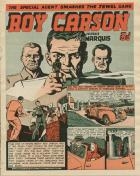
4 issues of Roy Carson comic (1950)
Just the worst kind of stereotypical detective/gangster schlock. And very repetitive even in the small selection i was able to find. [1/5]0 -
New Items:

The Ancient Allan by H.Rider Haggard (1920)
We start off in the 1890's with Allan Quartermain visiting a lady friend and then essentially Quartermain tells us an adventure tale of one of his ancestors. There's some weird stuff involved which i won't spoil but thats the gist. This whole setup is by far the most entertaining part. Witty, interesting, and just very fun.
So the main text itself is set in ancient Persia and Egypt. I'm guessing its around the same time as the movie/comic 300, as the Persians are busy fighting the Greeks.
Anyway so as i've said this is an Allan Quartermain story, Quartermain being most well known from King Solomon's Mines.
This also acts as a prequel and sequel to another Quartermain novel, The Ivory Child, so you'd probably want to read that first or a synopsis of it.
The main text of this is pretty standard adventure fare, but the author is well aware of that and tries to fast forward though the boring bits.
He also uses some fortune teller characters who lay out many of the details before they happen. Sort of acknowledging its predictability. So this is not a book which is relying on its plot, not in the broad details anyway.
This is a story which lives in the small moments. It has really distinct characters and a fair amount of humour. There's some real charm here.
It's still a product of its time and as with all Haggard is both sexist and racist, however it also has some very strong female and non-white characters.
Allan Quartermain as a character is often said to be a proto-Indiana Jones, however, he mostly takes on one of two roles in these stories.
Either as a Watson style narrator to some more badass characters' Holmes, or as a Green Hornet-like character. The not-entirely-useless-but-close white man dragged through the adventure by his much more competent ethnic side-kick.
In The Ivory Child he was very much the latter, in this he's a little more active but his side-kick and the other characters are still calling most of the shots.
There's some magic and crazy stuff here and some decent action especially towards the end, in fact the end battle seemed suspiciously like that of the 'Pelennor fields' from The Lord of the Rings :P .
But mostly it was just the charm that kept me going, also its short . By far the most likable version of Quartermain i've yet read, even if most of it was technically his ancestor... rather than the modern character but still. I mean its the same character, just from a different time if you see what i mean... how to explain this... ok... its like one of those Tom and Jerry cartoons where they're Musketeers or ancient Romans or something
. By far the most likable version of Quartermain i've yet read, even if most of it was technically his ancestor... rather than the modern character but still. I mean its the same character, just from a different time if you see what i mean... how to explain this... ok... its like one of those Tom and Jerry cartoons where they're Musketeers or ancient Romans or something  . [3/5]
. [3/5]
Amerika by Franz Kafka (1914)
Another of Kafka's unfinished works. A lot like David Copperfield, from what i read of it anyway the entire middle-third is a bit of a blur because i could not bare reading it properly and skimmed most of it.
You know those tv programs, mostly comedies or comedy-dramas, the ones that make you cringe? Those horribly uncomfortable social situations that make you squirm in your seat? Well thats how this made me feel.
I have a particularly tender spot for that sort of thing, i really.... can't stand it. So i suppose i should applaud Kafka, as i've never experienced that cringiness through the written form before, i've read Copperfield, Wuthering Heights, The Dram Shop by Emile Zola, 120 Days of Sodom, and many others which have made me feel uncomfortable for one reason or another but nothing quite in this way.
As i've said it has a very similar outline to David Copperfield with its rather innocent protagonist that keeps getting taken advantage of. The story's not bad although it is incredibly random. And there's some of the battles with those in power seen in the Castle but in very minor ways. Also Kafka's ability to suddenly show a situation in a new light, that i really loved in the Castle, is also there, again only to a small degree.
So quality wise not awful, at least the bits i saw from between the fingers over my eyes . Enjoyment-wise i hated it with the heat of a thousand suns
. Enjoyment-wise i hated it with the heat of a thousand suns  . So obviously my rating is based on the former :P . [2/5]
. So obviously my rating is based on the former :P . [2/5]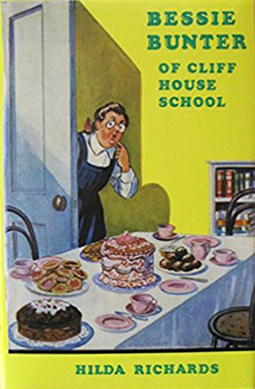
School Friend #1 (1919)
Short story introducing the sister of Billy Bunter, Bessie and her schoolmates. Bessie comes across a little bit smarter and therefore more evil than Billy. Also because they're girls her schoolmates can't just beat the hell out of her like the boys do to billy, thus making her a little harder to deal with. [3/5]
Film Item: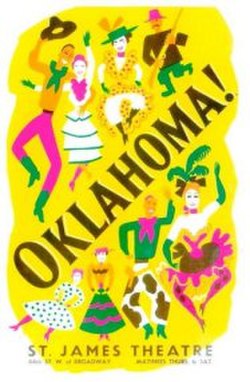
Oklahoma! (1943)
Watched the 1999 version. I still dislike musicals and the Western aesthetic but this still wasn't too bad. No particularly good songs but darker and weirder than expected, in a good way. [3/5]0 -
Advertisement
-
New Items:
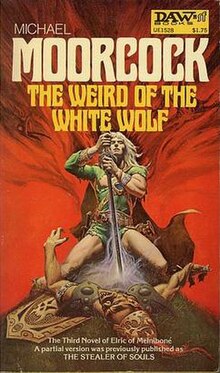
Elric of Melniboné by Michael Moorcock (1972)
Mature fantasy with great original world building. Really liked the start and end.
The opening is like some super-over-the top Conan novel but the last third felt more darkly humorous, as if the characters had wandered into Time Bandits or Labyrinth or something.
The main problem in my opinion is that at the start you really get to know the main hero but once the central plot gets going there seems to be a change in style and the reader gets pushed away. I never really felt connected to the protagonist after the first third.
Its also quite a random and fragmented story, as if it was a much longer book that was heavily pared down.
An interesting and unique feel, but it didn't make me care enough to want to read the rest of the saga. [3/5]
Andorra by Max Frisch (1961)
Really good play about a small fictional country presumably on the german border where tensions are growing as they expect an invasion. Mostly about racism but its more than that, it has a very Greek-tragedy feel to it, a conspiracy of circumstance and human failings. At times it also reminded me of Shirley Jacksons 'The Lottery' or 'Lord of the Flies'.
Only a couple of problems with it, one is a side event which happens to one of the female characters, its horrific and is really not addressed in any meaningful way. Its just sort of brushed aside, i found that a bit weak.
The other problem is probably a translation issue but i felt like some of the speeches were... a bit confusing, a little too esoteric or something. However i was really close to giving it five stars. [4/5].jpg/220px-Captain_Slaughterboard_(cropped).jpg)
Captain Slaughterboard Drops Anchor by Mervyn Peake (1939)
Childrens picture book. I like the drawings but that was a little too random for me. Also even as a child i think i would be annoyed that most of the characters disappear from the story half-way through.
Sidenote, its really, really gay. I'm not saying that as a positive or negative just thought it was interesting . [2/5] 0
. [2/5] 0
Advertisement
 edia/en/thumb/d/d0/What_Ever_Happened_to_Baby_Jane%3F_(1962).jpg/220px-What_Ever_Happened_to_Baby_Jane%3F_(1962).jpg
edia/en/thumb/d/d0/What_Ever_Happened_to_Baby_Jane%3F_(1962).jpg/220px-What_Ever_Happened_to_Baby_Jane%3F_(1962).jpg
